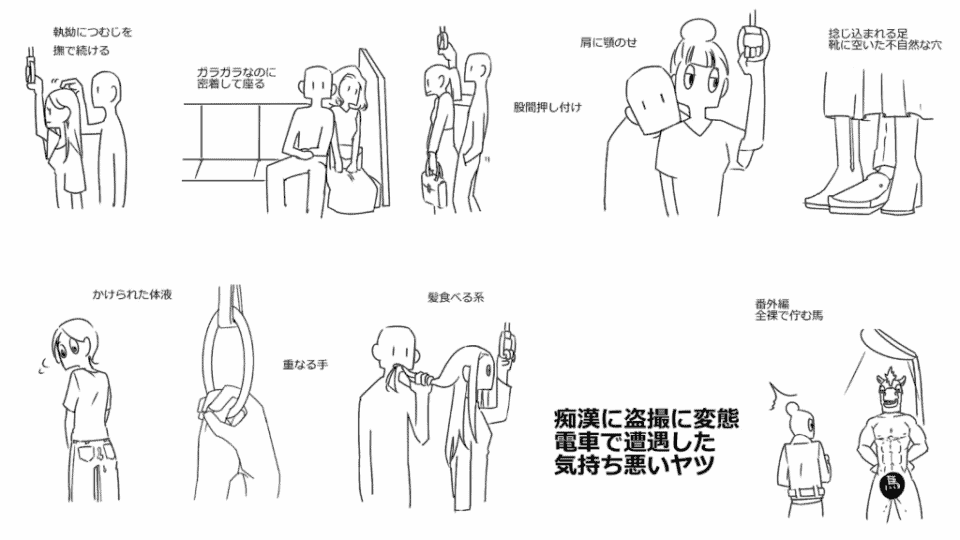Have you ever heard about the stories of dealing with chikan in Japan amongst women? If not, I’ll tell you how horrible it is!
Taking advantage of the lack of space in crowded places to grope is shameful. It needs to stop.

Women have chickened out when it comes to talking about chikan. Why? Despite its prevailing presence in Japan, there is little change in how the country is dealing with it. Some women we talked to braved through their trauma and lived through it again to share stories of dealing with chikan to help other women speak up.
- Related: Women’s rights in Japan
At rush hour, a woman’s only worry should be to catch a train or bus and make it to their destination on time. But being a woman is challenging. There are so many stories of dealing with chikan in Japan amongst woman.

Standing in crowded places for them is not only tiresome but also dangerous. Women in Japan are experiencing chikan on a daily basis, most often in public transport.
Page Contents
Is Chikan Common In Japan?
Yes, chikan, or groping, is a common problem in Japan. According to the National Police Agency of Japan, there were 2,233 reported cases of chikan in 2022. This is a significant undercount, as many victims are reluctant to report these crimes.
What is Chikan in Japan?
The term “chikan” (痴漢) is a Japanese word that refers to sexual harassment, particularly groping or molestation, committed in public places, often on crowded trains or buses. It is a serious societal issue that causes significant distress and harm to victims. Chikan is considered a crime in Japan, and perpetrators can face severe penalties, including imprisonment.
Chikan incidents typically involve a perpetrator intentionally touching or groping a victim’s body without their consent, often in crowded or confined spaces where it can be difficult to escape or identify the offender.
Victims of chikan may experience a range of emotions, including fear, humiliation, and anger. They may also suffer psychological trauma and lasting emotional distress.
The prevalence of chikan in Japan is attributed to various factors, including cultural norms, social attitudes, and societal structures. Some experts believe that Japan’s emphasis on politeness and non-confrontation may make it easier for perpetrators to get away with their crimes.
Additionally, the anonymity of crowded public spaces can provide a sense of cover for offenders.
Despite the challenges, there have been efforts to address the issue of chikan in Japan. The government has implemented various measures, such as increased police presence on public transportation and campaigns to raise awareness about the issue. Additionally, there are organizations that provide support and counseling to victims of chikan.
While chikan remains a significant problem in Japan, there is growing recognition of the issue and a commitment to address it. Through continued efforts to prevent and address chikan, Japan can work towards creating a safer and more respectful society for all.
Gross Utilization of Technology and Chikan in Japan
In a developed and technologically advanced country such as Japan, the inevitable happened. One of the grossest results of the desperation is that men started using the internet to organize and meet to ‘conduct’ a chikan occurrence.

Then came the introduction of ‘RapeLay’, a video game that allows perverts to get their way on public transportation. One-click on the button ‘prayer’ would result in upskirting the woman.
Although it was banned, one search on the dark web and thirty seconds later the game was found. stories of dealing with chikan in Japan come from the same.
Actions taken to Deal with Chikan in Japan
Considering the media coverage and the advent of the #metoo movement in Japan, chikan has been recognized as a grave offense that needed intervention from the government.
The Japanese government and various organizations have implemented a range of measures to address the issue of chikan, including:
- Increased police presence on public transportation
Police officers have been deployed in larger numbers on trains and buses, particularly during peak hours and on routes known to be more prone to chikan incidents. Their presence is intended to deter perpetrators and provide a sense of security for commuters.
- Women-only train cars:
The Metropolitan Police Department introduced women-only train cars at peak rush hours so that women can comfortably travel.
This action was taken after the department issued a report revealing that of all the molestation cases reported, 30% of the molestations occurred at peak morning rush hours between 7-9 AM. Another revelation was that 51% of all chikan happened in trains.
- Installation of surveillance cameras
Public transportation systems have been equipped with an extensive network of surveillance cameras, which can be used to monitor for suspicious activity and identify perpetrators. The footage from these cameras can also be used as evidence in criminal investigations.
- Public awareness campaigns
The government and non-profit organizations have launched public awareness campaigns to educate the public about chikan, including how to prevent it, how to report it, and how to support victims. These campaigns often use posters, pamphlets, and social media messages to reach a wide audience.
Some of the in-car posters said “Chikan is a crime” and “Beware of chikan“. The first one informs the public not to commit this punishable offence.

Staying vigilant in trains and buses to make sure they’re not the next target, men, women, and children alike. But the eradication of the disease that is chikan, is still a work in progress.
- Victim support service
There are a number of organizations that provide support and counseling to victims of chikan. These services can offer emotional support, practical assistance, and legal guidance to help victims cope with the trauma of their experience.
- Legal reforms
The Japanese government has made several legal reforms to strengthen penalties for chikan and make it easier for victims to report and prosecute these crimes. These reforms include increased prison sentences for perpetrators and the introduction of a new crime of “indecent assault” that covers a wider range of sexual harassment offenses.
These measures have helped to reduce the prevalence of chikan in Japan, but the problem remains a significant one. Continued efforts are needed to raise awareness, prevent chikan, and support victims.
Related: Wondering why the Japanese do not speak English? check out why!
Stories in solidarity

As ghastly as it is, experiencing chikan, we need to see the bright side and think that grief unites us. To know that this experience is shared, is to know that the gravity of the situation has been felt.
It proves itself to be an opportunity to create a meaningful impact by battling the first instinct of shame and replacing it with the braveness to open up. That’s how there are so many stories of dealing with chikan in Japan.
In Japan, multiple women go through this on a regular basis. Local and foreign. These women have come forward to reveal stories of how they dealt with chikan.
Such coming out stories leads to awareness amongst the public. The users of online media and the contributors of online media, all alike, should take it up as their responsibility to inform and educate people of what constitutes as chikan and how to ask for help when it happens.
An illustration by @ikng_0, an Osaka-based freelance illustrator, took the internet by the storm. The illustration depicts various types of sexual assaulters found on Japanese trains.
This was shared over 43,000 times and encouraged more victims to tell their stories of dealing with Chikan.

Destroying the stereotype — ‘Asking for it’
Say what you want, but now there is proof: women are not molested or groped because of dressing provocatively. The whole ‘asking for it’ argument, so popular and quick to blame women, becomes moot when the arrested chikan in Japan admits and reveals what drove them to ‘target’ a particular woman. In a research led by Ayako Uchiyama, she noted these findings:
First point to be noted was that less than 5% said that a target was noticed because of their provocative style of clothing. When talking about rape, the most common response, 45% of it, was that the victim seemed as if they wouldn’t report it to the police.
With other indecent assault cases, 48% of the offenders responded by saying that the victim was picked because of their demure and meek appearance, like they wouldn’t be able to do anything if someone attacked.
What can women do to deal with Chikan in Japan?

These offenders and assaulters take advantage of the knowledge that the victim will not talk to anyone about it. One way to break the pattern is to actually speak up. Make a scene that will stop chikan in Japan.
If you’re being groped in a public space, just raise your voice and catch the attention of fellow passengers. In most cases, someone will come to your aid and shame the assaulted. Stories of dealing with chikan in Japan, unfortunately, is quite common now.
Another resolve is to report the matter to the station master. With the help of some of the passengers on the train with you, the identified chikan in Japan, can be taken to the station master and be put in custody for further action.
Of course, sometimes you really can be too scared to say anything. Just try to remove yourself from the situation. Don’t be afraid of crying and ashamed of being upset. You’re entitled. Your security and personal space have been violated.
Open up, talk to people about it. It is often found that sharing such occurrences can help to deal with the trauma experienced after being assaulted.
All these stories of dealing with chikan in Japan is real and can happen to any woman if measures are not taken strictly.
Also read:
- Don’t tip when you’re in Japan, check out why!
- Check out these cheap hostels for a budget-friendly stay the next time you head to Tokyo!
- Would you pay $5000 for a pair of melons? Well, the Japanese would! Check out why.
- Want to know more about the Japanese Obon festival? Here’s your guide!





